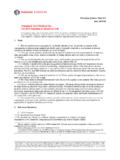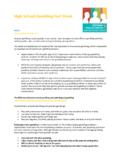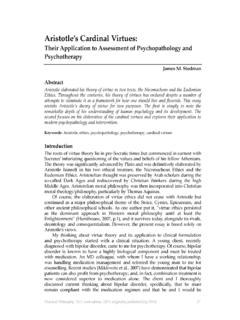Transcription of To the collaborators Understanding the Baha’i writings ...
1 Contents To the collaborators Understanding the baha i writings Prayer Life and Death TO THE collaborators The Ruhi Institute uses the term collaborators to refer to all who study, teach or apply its courses, wherever they may reside. These participants are indeed collaborators , because all share the Institute s purpose: to use the courses as means of serving the Cause and promoting the well-being of humanity. In every study group there is always a more experienced person who acts as a tutor. The other members of the group constitute the students who seek the tutor s help with their studies. However, it is clearly understood by all participants that they are engaged in a reciprocal process, one in which everyone learns. The responsibility of learning rests with each participant. It is the student who undertakes the active work of learning. The tutor facilitates this process and also gains new insights into the material.
2 The relationship is not that of a learned one with a group of ignorant people. Understanding the baha i writings , prayer and Life and Death are often the first units that a group of collaborators chooses for its studies. We hope the tutor will carefully go over the ideas presented here. Those who are studying these units for the first time need not concern themselves with this introduction as they will have to analyze it at a later time, when they themselves will act as tutors of this book for other groups of beginners. In studying the courses of Ruhi Institute, participants are expected to achieve three levels of comprehension. The first is a basic Understanding of the meaning of words and sentences of passages from the writings , which constitute the core of these courses. Thus, for example, after reading the quotation The betterment of the world can be accomplished through pure and goodly deeds, through commendable and seemly conduct , the student is asked: How can the betterment of the world be accomplished?
3 At first glance, this type of question may appear too simple. But the following two observations from actual experience point to some of the reasons for the adoption of a simple approach to this basic level of Understanding . Often for the study of the first unit in the book, the tutor will divide the group into pairs; one person in each pair is asked to read the quotation aloud and the other is asked to formulate a question, the answer to which would be the quotation. For some, such an exercise is extremely easy and is carried out swiftly. Others find constructing a question from a sentence challenging at the beginning and need practice before they acquire the necessary skills. This type of exercise is not, of course, applicable to most of the units of the Ruhi Institute and is done less and less frequently as the students advance in their studies. The second observation has to do with the participants who insist on giving their own opinions and strongly resist repeating the quotation as the answer to a question.
4 Clearly, there is nothing wrong in having and expressing one s own ideas; but an Understanding of the writings must begin by focusing the mind on what is being read before allowing one s imagination to roam and personal opinions to flow freely. It is quite likely that by first developing in the believers, early in their study of the Faith, a capacity to focus attention on the immediate and explicit meaning of sentences they read from the Holy writings , we will be contributing to the creation of unity of thought in our communities, since such a unity can only be attained when personal opinions are illuminated by Divine Wisdom. It s important to note here that achieving this first level of comprehension never involves a long discussion on the meaning of single words outside the context of the material being studied. In fact, most tutors find that using a dictionary to help the participants to understand difficult words actually interferes with their learning. It seems far more useful to help them learn how to infer the meanings of words through discussion of whole phrases and paragraphs.
5 The second level of comprehension is concerned with applying some of the concepts in the quotations in one s daily life. For example, exercise number one in the second section of the unit Understanding the baha i writings , which asks the participants to identify certain types of conducts as commendable, is easy to answer, yet it requires the group to think about some of the obvious applications of the corresponding quotation in the lesson. However, not all the exercises of this level can receive immediate and obvious answers. For instance, to decide if the statement There are so few good people in the world that their actions do not have any effect is true or false, the students have to establish how this statement contradicts the corresponding quotations they have studied from the writings of baha u llah. The third level of Understanding requires the participants to think about the implications of the quotations for situations with no apparent or immediate connection with the theme of quotation.
6 For example, the question of whether baha is may confess their sins to others refers to the prohibition against confession as a means of absolving sin, a deeply-rooted practice of Catholicism. The tutor should present this prohibition as the group consults on the implications of the verse, Bring thyself to account each day ere thou art summoned to a reckoning. Many years of experience with the courses of Ruhi Institute have shown that examining ideas at these three levels of Understanding helps collaborators create the conscious basis of a life of service to the Cause. But what may surprise someone who is unfamiliar with this experience is that efforts to prolong consultation on each idea beyond these levels, by introducing too many related concepts, actually diminish to a great extent the effectiveness of the courses. This is partly because each course should establish a rhythm of progress, so that the students will have a distinct sense that they are advancing rapidly according to their own capacities.
7 This does not mean that lessons should be passes over quickly and superficially without careful analysis of the exercises. Groups that have taken this superficial approach, merely filling the answers, have never lasted beyond a few sessions. The point to remember is that once an idea is understood and some insights into its applications have been gained, the group should advance to the next point in the lesson. Another reason for the caution against prolonged discussions has to do with the habit of speculation that unfortunately develops in some of our communities from time to time. It is natural that a verse from the writings should bring to mind myriads of noble and beautiful ideas. To share these ideas with the friends on appropriate occasions conduces to joy and happiness. But care must be taken so that this practice does not become an exercise in the expression of ego and an insistence on sovereignty of personal opinion. The experience of Ruhi Institute has shown that we do not suppress the imagination or personality of the participants when we refrain from posing questions such as, What does this mean to you?
8 ; on the contrary, we are helping to nurture the development of the communities which look first to the writings as the principal basis of consultation whenever they are faced with a question. We believe that the habit of thinking about the implications of the writings with the minimum of personal interpretation would eliminate a great share of the disagreements which afflicts consultation in many communities and would make the activities of our communities more effective. In preparing to teach the three units of this book, the tutor would do well to examine each section, categorize the exercises according to the three levels of comprehension and, if necessary, think of additional exercises that will stimulate consultation about each concept. The purpose of the first unit of the book, Understanding the baha i writings , is to develop in the participants the habit of reading the writings and thinking about them, beginning at first with one-sentence statements.
9 To read the Holy writings everyday, at least in the morning and at night, is one of the very important ordinances of our Faith. But reading the writings is not the same as reading the thousands of pages that a literate person sees during a life time. To read the sacred word is to drink from the ocean of Divine Revelation. It leads to true spiritual Understanding and generates forces that are necessary for the progress of the soul. In order to reach true Understanding , however, one must think deeply about the meaning of each statement and its applications in one s own life and in the life of society. Prayer is the second unit included in this book. In preparing to teach the unit, the tutor needs to reflect on its three principal objectives. The first is to clarify the concept of prayer itself and to help the participants understand its great importance as one of the laws of this Dispensation. In order to achieve this objective it s sometimes necessary to dissipate doubts and carefully examine ideas that may have their roots in erroneous interpretations of the past.
10 Above all, this objective implies clear Understanding of the necessity to observe this law, a need that is no less essential than that of nourishing our bodies every day. Beyond observing the law of prayer, each person must feel a profound desire to pray. Therefore, the second objective of this course is to awaken in participants the desire to converse with God and to feel the joy of being near to Him. Moreover, from an early age, everyone should develop spiritual habits; the habit of praying daily is among the most important of these. The third objective of the course concerns the attitudes with which prayer should be approached. Unfortunately, humanity is steadily losing its Understanding of how to pray, substituting empty and meaningless rituals for indispensable inner conditions. Therefore, the study groups should consult a great deal on the sections of the unit which refer to the attitudes of heart and mind that help one enter the state of prayer, and to the conditions that should be created in one s surroundings at the time of prayer.









